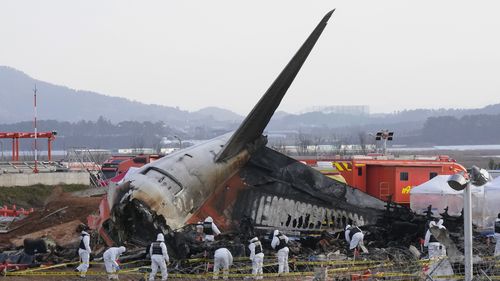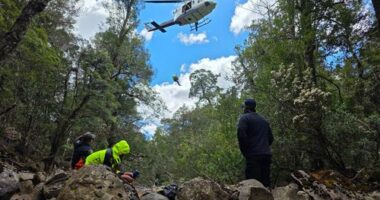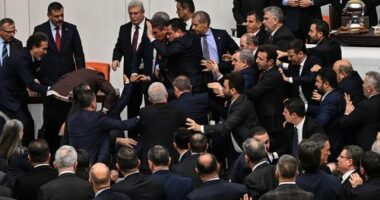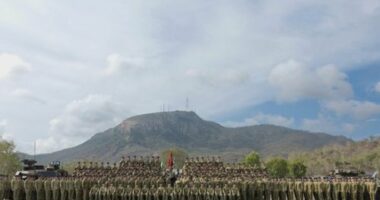Share this @internewscast.com
The preliminary findings of the inquiry into the tragic Jeju Air crash in December in South Korea reveal that although both engines of the aircraft experienced bird strikes, the pilots opted to turn off the engine that was less damaged just before the crash-landing occurred.
This conclusion, suggesting potential human error, sparked immediate and intense objections from grieving families and fellow pilots. They accused authorities of attempting to deflect the blame for the catastrophe onto the deceased pilots.

Initially, South Korea’s Aviation and Railway Accident Investigation Board had intended to release the results of their examination of the aircraft’s engines over the past weekend. However, due to strong protests from the relatives of the crash victims, who had been briefed about the findings earlier that day, the scheduled press conference was called off, as reported by government officials and the bereaved families.
“If they want to say their investigation was done in a reliable, independent manner, they should have come up with evidence that backs up their explanation,” said Kim Yu-jin, head of an association of bereaved families.
“None of us resent the pilots.”
The Boeing 737-800 operated by Jeju Air landed on its belly without its landing gear deployed at South Korea’s southern Muan International Airport on December 29.Â
It overshot the runway, slammed into a concrete structure and burst into flames.Â
It was the deadliest disaster in South Korea’s aviation history in decades, killing all but two of the 181 people on board.

Investigation signals pilots turned off the wrong engine
According to a copy of an unpublished briefing report obtained by The Associated Press, a South Korean-led multilateral investigation team said it found no defects in the plane’s engines built by France’s Safran and GE.
The report said thorough examinations of the engines found the plane’s right engine suffered more serious internal damage following bird strikes as it was engulfed in big fires and black smoke.Â
But the pilots switched off the plane’s left engine, the report said citing probes on the cockpit voice recorder, the flight data recorder and the engines’ examinations.
The cockpit voice recorder and the flight data recorder cited in the briefing report refers to data stored before the recording stopped.
The report didn’t say why the pilots shut off the less-damaged engine and stopped short of saying whether it was an error by the pilots.

Bereaved families, fellow pilots slam the probe
Bereaved families and pilots at Jeju Air and other airlines lambasted the investigation findings, saying authorities must disclose the cockpit voice recorder and the flight data recorder.
“We, the 6500 pilots at civilian airlines, can’t contain our seething anger against the preposterous argument by the Aviation and Railway Accident Investigation Board that lost neutrality,” the Korean Pilot Unions Alliance said in a statement on Tuesday.
Unionised pilots at Jeju Air also issued a statement urging authorities to present scientific evidence to show the plane should have landed normally if it flew with the less-damaged engine.
The latest report focused only on engine issues and didn’t mention other factors that could also be blamed for the crash.Â
Among them is the concrete structure the plane crashed into; it housed a set of antennas called localisers designed to guide aircraft safely during landings, and many analysts say it should have been made with more easily breakable materials.Â
Some pilots say they suspect the government wouldn’t want to mainly and prominently blame the localisers or bird strikes for mass deaths, as the Muan airport is under direct management of the Transport Ministry.
The Aviation and Railway Accident Investigation Board and the Transport Ministry have offered no public response to the criticism; they said they also won’t publicly discuss the engine investigation to respect demands by bereaved families.

A person familiar with the investigation told the AP that authorities are looking at the localisers and other issues, like whether air traffic controllers relayed the danger of bird strikes to the pilots swiftly enough and what emergency training Jeju Air offered to pilots.
The person, who requested anonymity citing the sensitive nature of the investigation, said authorities earlier planned to publicise the results of probes after reviewing various issues, but changed the plan and tried to release the outcome of the engine investigation at the request of bereaved families. He said authorities don’t intend to lay the responsibility for the disaster on the pilots.
Authorities aim to publish the investigation’s final results by next June, the person said.
Kwon Bo Hun, dean of Aeronautics College at the Far East University in South Korea, called the engine investigation report “clumsy” because it didn’t disclose evidence that supported its finding on the pilots.
He said it only irritated “emotional parts of us” as the investigation raised suspicions that it puts the whole blame on the dead pilots.
A former Transport Ministry-turned-university professor reached by the AP said the engine investigation report must be “reliable” as it’s based on an analysis of cockpit voice and flight data recorders that “don’t lie”; he spoke on condition of anonymity, citing the delicate nature of the issue.












